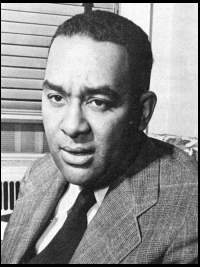-
|

|
Chapter 7: Early 20th C. American Lit
and Modernism
Richard Wright
1908-1960
|
©
Paul P. Reuben
September 13, 2019
E-Mail
|
Page Links: |
Primary
Works |
Selected
Bibliography 1980-Present
| Study
Questions |
MLA Style
Citation of this Web Page
|
Site
Links: |
Chap.
7: Index | Alphabetical
List
| Table
Of Contents
| Home
Page |

Source: The
Mississippi Writers Page - RW
The day
Native Son appeared, American culture was changed forever.
No matter how much qualifying the book might later need, it made
impossible a repetition of old lies." - Irving
Howe
Richard Wright has the
distinction of being the first African-American author whose work
appeared on the national bestseller lists. Native Son was an
instant success and sold a quarter of a million copies in its first
month of publication, and, together with Black Boy,
established Wright as a writer of power and intensity. His prose
captures the lyrical black dialect and paints unforgettable pictures
of the deep South and of Chicago of the 1930s.
Primary
Works
Uncle Tom's
Children: Four Novellas, 1938; Twelve Million Black
Voices: A Folk History of the Negro in the United
States, 1941; Native Son, 1940; Black Boy: A Record
of Childhood and Youth, 1945;
The Outsider, 1953; Savage Holiday, 1954; The
Long Dream, 1958; Eight Men, 1961; Lawd Today,
1963; White Man, Listen!, 1957; American Hunger,
1977.
Early Works: Lawd
Today!; Uncle Tom's Children; Native Son. Rampersad, Arnold
(ed. and notes). NY: Library of America, 1991.
Later Works: Black Boy
(American Hunger), The Outsider. Rampersad, Arnold (ed. and
notes). NY: Library of America, 1991.
| Top
| Selected Bibliography 1980-Present
Abernathy, Jeff. To Hell
and Back: Race and Betrayal in the Southern Novel. Athens: U of
Georgia P, 2003.
Algeo, Ann M. The
Courtroom as Forum: Homicide Trials by Dreiser, Wright, Capote, and
Mailer. NY: Peter Lang, 1996.
Brachner, Mark.
Literature and Social Justice: Protest Novels, Cognitive Politics,
and Schema Criticism. Austin: U of Texas P, 2013.
Brewton, Butler E.
Richard Wright's Women: The Thematic Treatment of Women in Uncle
Tom's Children, Black Boy and Native Son. NY: Academica,
2010.
Brivic, Sheldon. Tears of
Rage: The Racial Interface of Modern American Fiction: Faulkner,
Wright, Pynchon, Morrison. Baton Rouge: Louisiana State UP, 2008.
Campbell, James. Exiled
in Paris: Richard Wright, James Baldwin, Samuel Beckett, and Others
on the Left Bank. Berkeley: U of California P, 2003.
Davis, Charles T. and Michel
Fabre. Richard Wright: A Primary Bibliography. Boston: G. K.
Hall, 1982. Z8986.323 .D38
Drake, Kimberly S.
Subjectivity in the American Protest Novel. NY: Palgrave
Macmillan, 2011.
Ellis, Aimé J. If
We Must Die: From Bigger Thomas to Biggie Smalls. Detroit, MI:
Wayne State UP, 2011.
Fabre, Michel. The World
of Richard Wright. Jackson: U of P of Mississippi, 1985. PS3545
.R815 Z65133
Felgar, Robert. Richard
Wright. Boston: Twayne, 1980. PS3545.R815 Z6517
- - -. Student Companion
to Richard Wright. Westport: Greenwood, 2000.
Folks, Jeffrey J. From
Richard Wright to Toni Morrison: Ethics in Modern and Postmodern
American Narrative. NY: Peter Lang, 2001.
Fowler, Doreen. Drawing
the Line: The Father Reimagined in Faulkner, Wright, O'Connor, and
Morrison. Charlottesville: U of Virginia P, 2013.
Green, Tara T. A
Fatherless Child: Autobiographical Perspectives on African American
Men. Columbia: U of Missouri P, 2009.
Hakutani, Yoshinobu.
Critical Essays on Richard Wright. Boston: G.K. Hall, 1982.
PS3545.R815 Z62
- - -. Richard Wright and
Racial Discourse. Columbia: U of Missouri P, 1996.
Hricko, Mary. The Genesis
of the Chicago Renaissance: Theodore Dreiser, Langston Hughes,
Richard Wright, and James T. Farrell. NY: Routledge, 2009.
JanMohamed, Abdul R. The
Death-Bound-Subject: Richard Wright's Archaeology of Death.
Durham: Duke UP, 2005.
Kostelanetz, Richard.
Politics in the African-American Novel: James Weldon Johnson, W.
E. B. Du Bois, Richard Wright, and Ralph Ellison. NY: Greenwood,
1991.
Kiuchi, Toru. Richard
Wright: A Documented Chronology, 1908-1960. Jefferson, NC:
McFarland, 2014.
Macksey, Richard and Frank
E. Moorer, eds. Richard Wright, a Collection of Critical
Essays. Englewood Cliffs, N.J.: Prentice-Hall, 1984. PS3545 .R815
Z815
Miller, Eugene E. Voice
of a Native Son: The Poetics of Richard Wright. Jackson: UP of
Mississippi, 1990. PS 3545 .R815 Z77
Miller, R. Baxter. On the
Ruins of Modernity: New Chicago Renaissance from Wright to Fair.
Champaign, IL: Common Ground, 2012.
Relyea, Sarah. Outsider
Citizens: The Remaking of Postwar Identity in Wright, Beauvoir, and
Baldwin. NY: Routledge, 2006.
Tuhkanen, Mikko. The
American Optic: Psychoanalysis, Critical Race Theory, and Richard
Wright. Albany: State U of New York P, 2009.
Weiss, M. Lynn. Gertrude
Stein and Richard Wright: The Poetics and Politics of Modernism.
Jackson: UP of Mississippi, 1998.
Study
Questions
1. Is Dave's intended flight
at the end of "Almos' a Man" dramatically credible? What happens in
the story that supports such a development in his character. Notice
the description of him at the end of the story. Consider his recovery
of the gun, the crowd's reaction to his shooting Jenny, and his
future indebtedness to Hawkins.
2. James Baldwin criticized
Bigger Thomas, the protagonist of Native Son, as being too
limited a character to stand for black men's problems. Does Thomas
represent a recognizable racial condition in this story? Which aspect
of his character seems more significant, his race or his
youth?
3. Although Wright's work
appeared later than the poets of the Harlem Renaissance, he reflects
some of their concerns. Trace the theme of manhood in poems by
Sterling Brown and Wright's "The Man Who Was Almost a Man." What do
these writers tell us about manhood as an American experience?
4. Compare and contrast
Richard Wright's story with Zora Neale Hurston's prose. Are these
writers exploring race or gender, or both?
MLA Style
Citation of this Web Page
Reuben, Paul P.
"Chapter 7: Richard Wright." PAL: Perspectives in American
Literature- A Research and Reference Guide.
URL: http://www.paulreuben.website/pal/chap7/wright.html
(provide page date or your date of logon).
| Top
|

